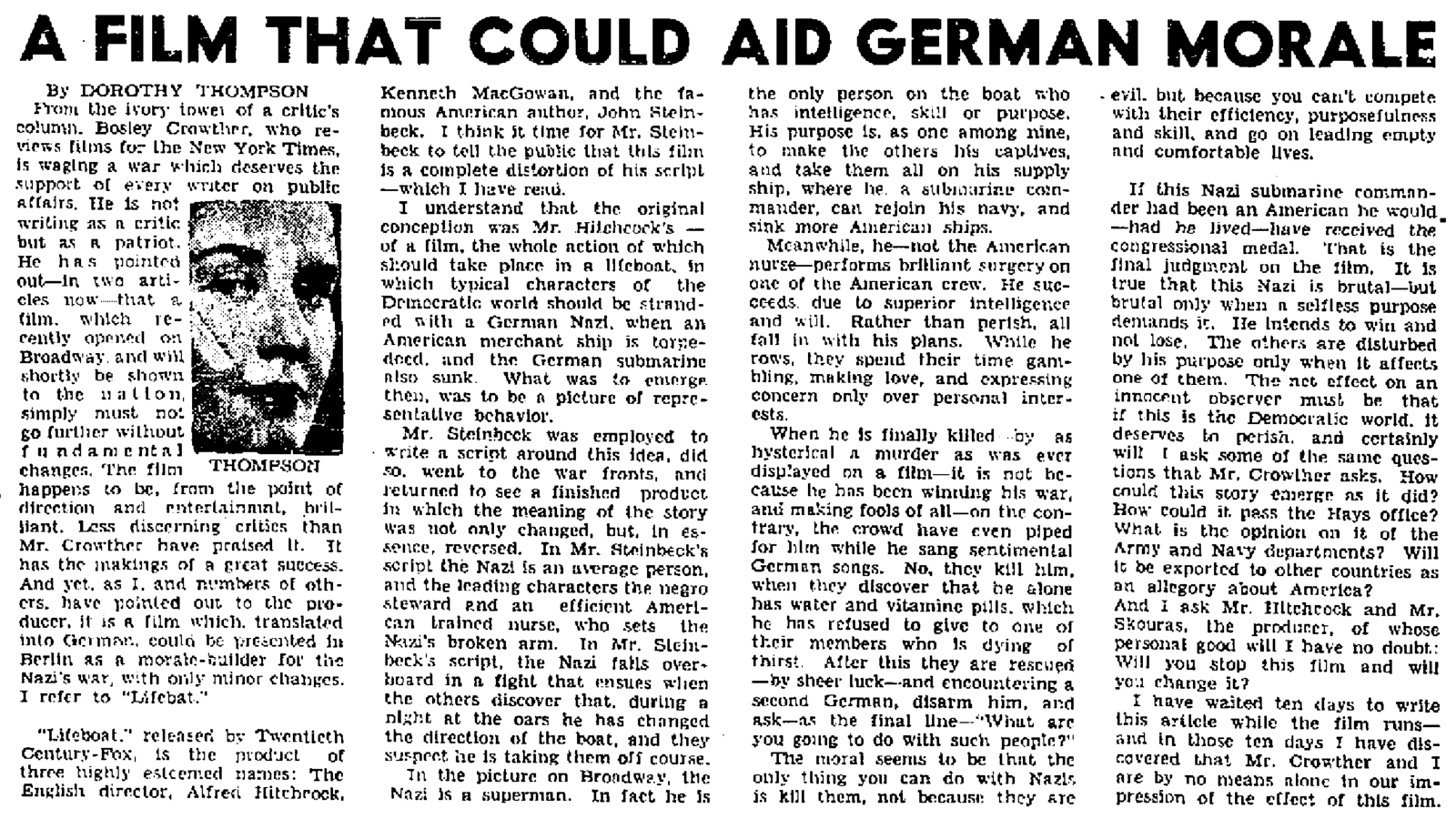Amarillo Globe (31/Jan/1944) - A Film that Could Aid German Morale
Details
- article: A Film that Could Aid German Morale
- author(s): Dorothy Thompson
- newspaper: Amarillo Globe (31/Jan/1944)
- keywords: Alfred Hitchcock, John Steinbeck, Kenneth Macgowan, Lifeboat (1944), New York City, New York, Twentieth Century-Fox Film Corporation
Article
A FILM THAT COULD AID GERMAN MORALE
By Dorothy Thompson
From the ivory tower of a critic's column, Bosley Crowther, who reviews films for the New York Times, is waging a war which deserves the support of every writer on public affairs. He is not writing as a critic but as a patriot. He has pointed out — in two articles now that a film, which recently opened on Broadway, and will shortly be shown to the nation, simply must not go further without fundamental changes. The film happens to be, from the point of direction and entertainment, brilliant. Less discerning critics than Mr. Crowther have praised it. It has the makings of a great success. And yet, as I, and numbers of others, have pointed out to the producer, it is a film which, translated into German, could be presented in Berlin as a morale-builder for the Nazi's war, with only minor changes. I refer to "Lifebat." [sic]
"Lifeboat." released by Twentieth Century-Fox, is the product of three highly esteemed names: The English director, Alfred Hitchcock, Kenneth MacGowan, and the famous American author, John Steinbeck. I think it time for Mr. Steinbeck to tell the public that this film is a complete distortion of his script — which I have read.
I understand that the original conception was Mr. Hitchcock's — of a film, the whole action of which should take place in a lifeboat, in which typical characters of the Democratic world should be stranded with a German Nazi, when an American merchant ship is torpedoed, and the German submarine also sunk. What was to emerge, then, was to be a picture of representative behavior.
Mr. Steinbeck was employed to write a script around this idea, did so, went to the war fronts, and returned to see a finished product in which the meaning of the story was not only changed, but, in essence, reversed. In Mr. Steinbeck's script the Nazi is an average person, and the leading characters the negro steward and an efficient American trained nurse, who sets the Nazi's broken arm. In Mr. Steinbeck's script, the Nazi falls overboard in a fight that ensues when the others discover that, during a night at the oars he has changed the direction of the boat, and they suspect he is taking them off course.
In the picture on Broadway, the Nazi is a superman. In fact he is the only person on the boat who has intelligence, skill or purpose. His purpose is, as one among nine, to make the others his captives, and take them all on his supply ship, where he, a submarine commander, can rejoin his navy, and sink more American ships.
Meanwhile, he — not the American nurse — performs brilliant surgery on one of the American crew. He succeeds, due to superior intelligence and will. Rather than perish, all fall in with his plans. While he rows, they spend their time gambling, making love, and expressing concern only over personal interests.
When he is finally killed by as hysterical a murder as was ever displayed on a film — it is not because he has been winning his war, and making fools of all — on the contrary, the crowd have even piped for him while he sang sentimental German songs. No, they kill him, when they discover that he alone has water and vitamin pills, which he has refused to give to one of their members who is dying of thirst. After this they are rescued — by sheer luck — and encountering a second German, disarm him, and ask — as the final line — "What are you going to do with such people?"
The moral seems to be that the only thing you can do with Nazis is kill them, not because they are evil, but because you can't compete with their efficiency, purposefulness and skill, and go on leading empty and comfortable lives.
If this Nazi submarine commander had been an American he would, — had he lived — have received the congressional medal. That is the final judgement on the film. It is true that this Nazi is brutal — but brutal only when a selfless purpose demands it. He intends to win and not lose. The others, are disturbed by his purpose only when it affects one of them. The net effect on an innocent observer must be that if this is the Democratic world, it deserves to perish, and certainly will. I ask one of the same questions that Mr. Crowther asks. How could this story emerge as it did? How could it pass the Hays office? What is the opinion on it of the Army and Navy departments? Will it be exported to other countries as an allegory about America? And I ask Mr. Hitchcock and Mr. Skouras, the producer, of whose personal good will I have no doubt: Will you stop this film and will you change it?
I have waited ten days to write this article while the film runs — and in those ten days I have discovered that Mr. Crowther and I are by no means alone in our impression of the effect of this film.

